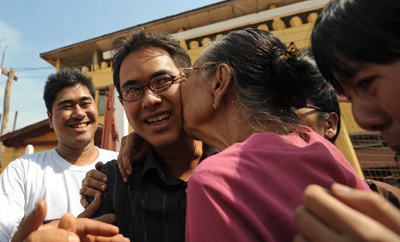Bangkok, January 13, 2012–The Committee to Protect Journalists welcomes the release of nine journalists who were freed as part of a mass release of at least 600 political prisoners in Burma on Friday, but calls on President Thein Sein to release reporters still being held in detention and to implement press reforms that would end the country’s repressive media environment.
Journalists Win Maw, Sithu Zeya, Maung Maung Zeya, Hla Hla Win, Ngwe Soe Linn, Zaw Thet Htwe, Myint Naing, Thant Zin Aung, and Nay Phone Latt were all released today from detention, according to news reports and CPJ research. Some of the freed journalists were serving sentences as long as 32 years for their reporting, CPJ research shows.
CPJ can confirm that at least three journalists–Ne Min, Zaw Tun, and Nyi Nyi Tun–are still being held by Burmese authorities. Other journalists who work clandestinely for fear of retribution may still also be in prison, CPJ research shows. CPJ will continue to monitor lists of released detainees as they are made public.
“CPJ welcomes the release of these journalists, but calls for the freedom of all the reporters still held behind bars in Burma,” said Shawn Crispin, CPJ’s senior Southeast representative. “Today’s mass amnesty provides a starting point for Thein Sein’s government to implement meaningful media reforms and reverse his country’s reputation as one of the world’s worst press freedom offenders.”
Among those released today were the five reporters of the Democratic Voice of Burma (DVB) that the exile-run news organization had identified by name. A DVB representative told CPJ on Friday that a number of their reporters were still behind bars. The DVB journalists remain anonymous because of the group’s concerns that Burmese authorities may extend their sentences if they are found to have reported secretly for DVB.
Today’s mass release also included political activists, opposition politicians, ethnic minority leaders, Buddhist monks, and a former prime minister from the former military regime, according to news reports. It is unclear exactly how many prisoners were released.
Human rights groups estimated the Burmese government held between 600 to 1,500 political prisoners before this release. Western governments have held out the release of political prisoners as a pre-condition for removing the economic and financial sanctions they maintain against Burma in response to the past military government’s abysmal human rights record.
Thein Sein’s military-backed, democratically elected government has initiated a series of reforms, including dialogue with opposition leader Aung San Suu Kyi, since assuming office last March. Those moves have included lifting some restrictions on Burma’s non-news media, including the removal of pre-publication censorship of non-news publications and greater freedom for local media to report on government policies. The government has also lifted blocks on foreign and exile news websites, including those frequently critical of the current and past military-backed regimes.
“While recent signals have been positive from a press freedom perspective, there is still a long way to go before Burma’s news media could be considered even remotely free,” said CPJ’s Crispin. “Until Thein Sein’s government ends pre-publication censorship of local publications and amends the various laws used to repress the press, Burma will remain among the most repressive media environments in the world.”
CPJ released a special report on Burma’s media situation last September that called on Thein Sein’s government to release all journalists held in detention and stop censoring the local media.
